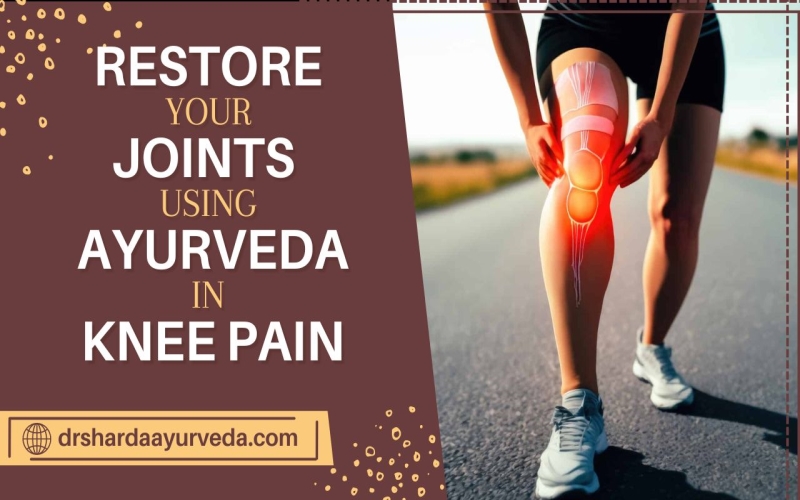Restore Your Joints using Ayurveda In Knee Pain

Life is meant to be enjoyed and not continually battle with the pain. The pain may be minor or major but it ultimately affects the quality of life. One such commonly heard concern is related to Knee pain. From struggling with knee pain in day-to-day life, one has to cut down on routine activities.
Sometimes people ignore knee pain but are not aware of the complications they are inviting. The pain turns chronic, and in certain situations, even surgery is suggested by the experts.
Surgery is always scary, the pain of the after-effects of surgery and the months in bed for recovery is also a major concern. Moreover, a troubling point arises, will it be recovered forever? Before turning to a green signal for surgery, stop and think, what if there’s an alternative?
The answer to the above question is Ayurveda which has been proven to treat knee pain, that too without surgery. Dr. Sharda Ayurveda has saved numerous patients from knee replacement surgery by providing treatment based on Ayurvedic principles. Ayurvedic knee pain treatment involves no negative effects on the body as it offers herb-based medicines and promotes a healthy lifestyle. The article mentions the causes, symptoms, and treatment for knee pain.
Facts about Knee Pain
Knee pain was common in senior citizens earlier but unfortunately, this has become an ordinary concern in the young and adult generations today. According to the Times of India, more than 15 crore people in India are diagnosed with knee pain out of which 4 crore are suggested knee replacement surgery. The percentage of women is more than men in knee pain. The contributing factors to the high percentage of women are poor diet and low nutritional values due to which 90% of them suffer from Vitamin D deficiency, which maintains bone strength.
Symptoms for Knee Pain
- Pain in knee joint
- Stiffness
- Swelling
- Difficulty in walking
- Popping sound with movement
- Weakness
The symptoms of knee pain should not be ignored. The faster one detects the symptoms and seeks treatment the quicker one can get back to normal and pain-free life.
Reasons for Knee Pain
Knee pain can potentially change one’s life concerning mobility and physical weakness. Having painful and stiff knees can be challenging in daily routine. After knowing the symptoms, the following reasons can be acknowledged to know more about knee pain.
· Tendonitis:
A tendon is a flexible rope-like tissue that connects muscles to bone. Tendonitis occurs when the tendon is inflamed. The problem generally occurs while performing some sports (intense physical activities) like running, jumping, or cycling. Swelling, pain, and cracking sensation in the knee joints are observed in tendonitis.
· Twist or strained knee:
Ligaments join the shinbone or tibia (lower leg bone) with the upper thigh bones. A sudden twist or blow tears this ligament in the knee. This sudden twist is known as a knee sprain, causing unbearable pain, swelling, and difficulty in walking.
· Arthritis:
Arthritis such as Osteoarthritis and Rheumatoid Arthritis, can become a reason for knee pain.
- In osteoarthritis- In the knee, there is a protective tissue called cartilage at the end of the bone. With time, the tissue gets worn out by bearing excessive weight or repeated injury. This progressive loss of cartilage results in Osteoarthritis, thus causing pain in the knee.
- In Rheumatoid Arthritis– The immune system mistakenly attacks the synovial membrane which covers the knee joint. This synovial membrane produces the lubricating fluid which protects the cartilage. With its damage, it causes inflammation, swelling, and pain in the knee.
· Obesity:
Body weight is one of the major factors behind knee pain. A sedentary lifestyle and faulty diet including junk, processed, and oily food can make a person obese. A weight higher than BMI (Bio Mass Index) can cause damage to the knees. Today, two out of three adults face obesity or are overweight. In general, being obese or BMI of 36 or above can increase the chances of developing Osteoarthritis.
· Torn Cartilage or Meniscus Tear:
A meniscus is a fibrocartilage that acts as a shock absorber between the femur (thigh bone) and tibia (lower leg bone). The role of maintaining knee stability by transmitting the weight from one bone to another is performed by the meniscus. The breakage of the meniscus generally happens when the knee is twisted while playing sports or minor injury. One faces difficulty in bending, straightening, or moving the knee along with pain, stiffness, or swelling.
How Joints Get Affected by Knee Pain?
Severe knee pain is debilitating and becomes difficult to manage. The pain in the knee joint also hurts the other joints of the body and there are different ways to relieve joint pain.
The knee is the biggest complex joint which bears tons of pressure every day while walking, running, sitting, or playing. A timely treatment of knee pain is the foremost step towards a healthy lifestyle. People with knee pain are often observed with antalgic gait while moving. Antalgic gait, also known as limp, is an abnormal pattern of walking.
People generally put the body weight on the healthier knee rather than the painful one, making it easy to stand and walk. An antalgic lean opted to bear less pain and can disturb the whole body posture. Knees are meant to handle equal weight on both sides and when pressure is put on one side, it also affects the other joints like the opposite leg, hip joint, ankle, etc. A long injury or persistent knee discomfort may result in limping, which leads to other joint issues such as:
- Inflammation and stiffness
- Fatigue
- Soreness
- Osteoarthritis, etc.
Ayurvedic Treatment for Knee Pain
According to Ayurveda, pain in the knee or swelling is called Sandhivata, a condition in which the joints are affected by vitiated vata and ama. The objective of knee pain treatment with Ayurveda is to dispose of the issues like tenderness, swelling, inflammation, pain, etc. It aims to empower the individual with a healthy life so that one can enjoy life with no barriers.
In Ayurveda, natural herbs like turmeric, ginger, neem, ashwagandha, amla, triphala, pippali, etc. are used in medicines that are capable of easing pain. Adoption of a healthy lifestyle and diet including fresh vegetables and fruits can relieve numerous health problems including joint pain. One can practice yoga, exercise, walking, and other physical activity daily to enhance the recovery process.
Dr. Sharda Ayurveda is the Best Ayurvedic Hospital and the team of professionals is always ready to serve the suffering of humanity with great commitment and dedication. They offer affordable, authentic Ayurvedic treatment with herbal remedies. A personalized consultation followed by medical tests, medicines, and remedies with modifications in lifestyle and diet is done under a specialized team of doctors. Moreover, there is a facility for online consultation for worldwide patients.





